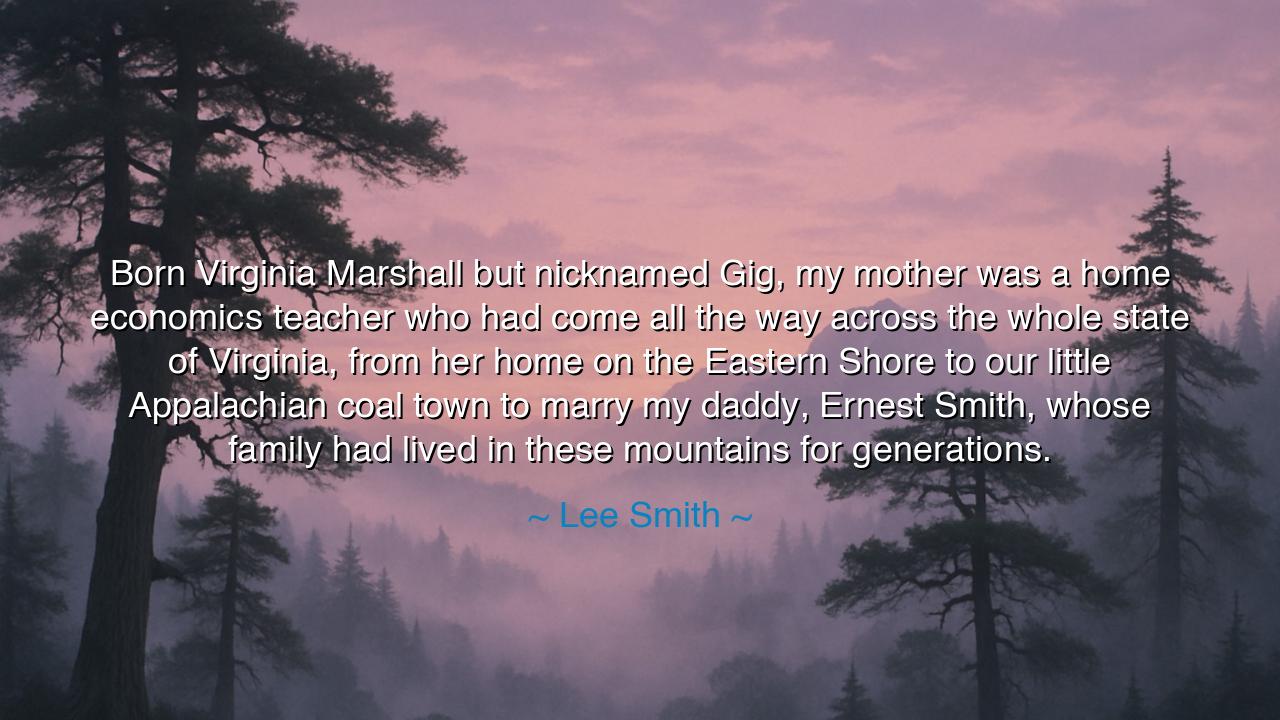
Born Virginia Marshall but nicknamed Gig, my mother was a home
Born Virginia Marshall but nicknamed Gig, my mother was a home economics teacher who had come all the way across the whole state of Virginia, from her home on the Eastern Shore to our little Appalachian coal town to marry my daddy, Ernest Smith, whose family had lived in these mountains for generations.






The novelist Lee Smith, teller of mountain stories and singer of Southern lives, once wrote of her mother: “Born Virginia Marshall but nicknamed Gig, my mother was a home economics teacher who had come all the way across the whole state of Virginia, from her home on the Eastern Shore to our little Appalachian coal town to marry my daddy, Ernest Smith, whose family had lived in these mountains for generations.” In this single sentence, woven with love and memory, lies not only the story of a family, but also the eternal tale of migration, tradition, and the union of two worlds—one rooted, one traveling, one ancient, one new.
Her mother, Virginia “Gig” Marshall, is described first not by her role as wife or mother, but by her own vocation—a teacher. Already this marks her as a figure of strength and independence, a woman who carried knowledge in her hands and gave it to others. She came “all the way across the whole state,” leaving behind the flat coastal plains of the Eastern Shore, a land of sea winds and sand, to dwell in the shadowed mountains of Appalachia. This was no small journey. In that time and place, such a move meant leaving kinfolk, customs, and all that was familiar, to embrace the unknown. Hers was a choice of courage, and of love.
On the other side stood Ernest Smith, son of the mountains, heir to generations of coal town life. His family had known those ridges and hollows for longer than memory could recall. Their roots were deep, their traditions strong, their way of life shaped by coal, hardship, and endurance. To this enduring lineage came Gig, a woman of the Eastern Shore, bringing her own stories, her own customs, her own voice. Their union was more than a marriage; it was the joining of two landscapes, two cultures, two threads of Virginia woven into one household.
There is a universality in this tale. Throughout history, families have been forged by such unions—the wandering spirit meeting the rooted soul. Consider the biblical story of Ruth, who left her own people to live among strangers and became the mother of kings. Or recall the pioneers who journeyed westward across America, carrying books, quilts, and skills into new lands where they intermarried with those who had tilled the soil for generations. In every age, the crossing of boundaries—geographical or cultural—creates the seedbed of new legacies.
Lee Smith’s remembrance carries not only affection but also reverence for endurance. She sees in her mother’s move across Virginia the courage to leave home for love, and in her father’s rootedness the quiet nobility of those who endure in one place. Together, they embody the balance of human life: the need to wander and the need to remain, the courage to seek new beginnings and the strength to preserve what has always been.
The lesson for us is clear: we are all born of journeys and rootedness. Some among us are called to venture forth, to leave behind the familiar and seek a new life; others are called to hold the ground, to preserve tradition, memory, and belonging. Both are noble, and together they create the richness of families, communities, and nations. To despise the wanderer is to forget that they carry new gifts; to despise the rooted is to forget that they guard the hearth. The union of both creates the fullness of human life.
Practically, this means honoring the stories of those who came before us—the ones who traveled far, and the ones who stayed. It means listening with gratitude to the voices of parents and grandparents, for in their journeys and rootedness we find the soil of our own existence. And it means carrying their courage into our own lives: daring to move when love calls us, daring to remain when duty demands us.
Thus, Lee Smith’s words are more than a memory of her mother and father; they are a teaching for us all. They remind us that every family is born of journeys and traditions, of roots and wings. And if we honor both—the courage to leave, and the strength to remain—we too will live lives that endure, like the mountains themselves, yet ever open to the winds that carry us forward.






AAdministratorAdministrator
Welcome, honored guests. Please leave a comment, we will respond soon